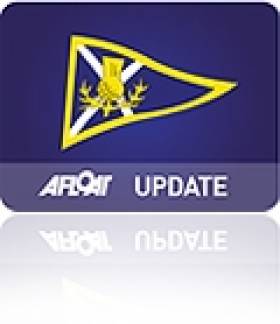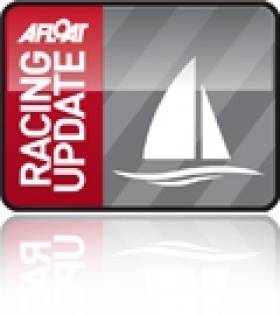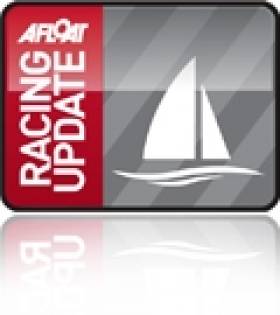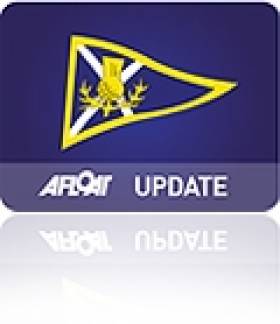Displaying items by tag: Scottish Series 2010
Royal Ulster’s John Minnis Picks up His Scottish Series Trophy at Clyde Cruising Club’s Annual Prizegiving
The North Rotunda in Glasgow was the swanky venue for the Clyde Cruising Club’s Annual Prizegiving last weekend and there to pick up his prizes won at the Scottish Series way back at the end of May was Royal Ulster’s John Minnis and crew Jeff Flannigan of the Beneteau 31.7 Final Call.
Having crossed the North Channel to the strictly controlled Scottish Series, the Final Call crew clocked up a Class 3 win, convincingly counting two firsts and two seconds as well as lifting the Causeway Cup for the best performance in the Series by a boat-based outside Scotland (other than the Series winner). Minnis also holds the Beneteau 31.7 Irish National Championships 2021 title and was Afloat Sailor of the Month for May.
Having moved on and up to the RC 35 class, John Minnis’s newly acquired Archambault 35, Final Call II, is in the boatyard in Bangor, getting ready for another competitive season in ’22.
Equinox and Antix Take Scottish Honours
A young Irish crew from Howth topped IRC Class 4, the biggest class which had 20 entries at the Scottish Series this evening. Ross McDonald and the crew of the Howth based X332 Equinox strung together a first and two second places from the final three races to win the class by four points from last year's class winners on the J92 NiJinsky. Robert Yates and his crew won both races today but finished second by four points ahead of the Davidson 36 Hops which had lead into the final day but which could only make a fifth and seventh today.
Anthony O'Leary and his Cork crew of the Ker 39 Antix conclusively won IRC Class 1 after posting a further two victories today in near perfect conditions. O'Leary, a long time supporter of the Scottish Series has won twice before in 2004 and 2006.
Counting six wins from eight starts in the nine boat strong class, Antix has been impressive across the wind ranges, proving the team are in good shape for the upcoming Rolex Commodore's Cup international team regatta in August.
Their class had depth including another three past winners of the overall top trophy in second, third and fourth places.
After more than three decades of trying with probably as broad a variety of different yachts that any one owner-skipper has campaigned at this key regatta with - from a slippery 37 foot ultra light Selection production race boat to a heavy Trintella 42 foot cruising boat - veteran Clyde owner-skipper John Corson and his long serving crew of the immaculately prepared Corby 33 Salamander XX lifted the Scottish Series Trophy, the top award for the annual Brewin Dolphin Scottish Series this evening.
"I am shocked and stunned." Said an emotional Corson, 80. " I don't know what to say. We have been so close so many times before that you just never know what is going to happen, or who it is going to go to. So I think most of all I just feel so relieved."
His win is a popular one. Corson has been a huge supporter of Clyde racing, and perhaps the most zealous participant over many years, competing from early season frostbite races right through until December year in year out. He has introduced many youngsters
His win, along with a crew of whom some have sailed with him for nearly 20 years, comes after many near misses. The veteran shed a tear or two before accepting the top trophy, just as his team did in 2005 when they were leading their class with a string of wins when their mast crashed down and their regatta was ended prematurely.
"This is a really, really special thing for John. He has always wanted to win this. In a sense this is his Olympics, the biggest thing in sailing for him so it is a real honour to have contributed. We have been close before, but this time things came together. After last year we had plugged the gaps which we felt we might still have in terms of optimising the boat, the crew work is really exemplary and the result of many long hours on the water over the years. So this is very special." Said John Highcock, the Clyde sailmaker who steered Salamander XX.
"It is so well deserved. Totally right." Commented double winner Anthony O'Leary
Corson and his crew won seven of their eight races in IRC Class 3, dropping an eighth as their allowable discard. With Clyde sailmaker John Highcock steering, Salamander XX's performance today was nothing short of electric. Twice today they were quick enough to be ahead of the leaders of Class 2 which had started five minutes ahead.
IRC Class 2 went right to the final race with the Clyde brothers Richard and Paul Harris triumphing after posting a third and a second on their Iain Murray designed Sydney 36.
The challenge from the Welsh-Irish new Corby 36 Roxy 6 faded notably in the lighter conditions of Sunday. Chris Bonar's BH36 Bateleur 97 finished with a flourish, two first places today, but that was not enough for them to catch their Clyde compatriots and they had to settle for third overall.
The only crew to have won all of their races right the way through the regatta is Ruairadh Scott's team on King Quick in Sportsboat Class 1. They counted eight first places from nine starts and were certainly among the elite group of contenders for the overall top trophy.
Comm Cuppers lead Scottish Series
Irish Commodore's Cup team-mates Antix and Roxy 6 lead Classes 1 and 2 after two days at the Brewin Dolphin Scottish Series in Tarbert. Yesterday produced one good race, one slow and difficult one as an early southerly breeze died away to next to nothing.
As it dissipated, so the fortunes of several of the regatta’s top contenders evaporated slowly and painfully with it.
Several crews, who had composed unbeaten scorelines to date, became rooted to the water in the very light winds, while their opposition ghosted away to big wins.
So difficult have the breezes proven so far this regatta that for the first time in many years no one boat among any the 13 classes has managed to win all of their races.
In IRC Class 4 the Clyde’s John Corson and his crew on Salamander XX added their third successive win in the morning’s first race extending their lead, but in the second windward-leeward contest they were just one of many who became snared on the wrong side when the light breeze collapsed.
Their main rivals to date Accrewed Interest steered by past Scottish Series trophy winner Steve Goacher, a Lake District sailmaker, disappeared progressively up the course and went on to win by just under two minutes ahead of Sloop John T, whilst Salamander XX could only struggle to an eighth place.
The race lasted three hours and 25 minutes for the Clyde team on the Corby 33 Salamander XX two hours more than it did for Accrewed Interest.
The story was similar in IRC Class 2 where Roxy 6, was another team which fell unfortunate victims to the split in the breeze in the afternoon.
After two first places and a sixth, the recently launched custom Corby 36, Roxy 6 was another victim of the Loch Fyne doldrums. The Class 2 leaders slumped slowly to a sixth in their seven boat fleet leaving them tied on points with Richard and Paul Harris’ Tanit, the Sydney 36, which had slipped away to win.
One of most consistent crews now with three first places and one second is 2003 Scottish Series Trophy winner Ruaraidh Scott and his team in Sportsboat Class 1.
That fleet is entirely composed of 1720 Cork One designs with the exception of a solitary Melges 24. And incorporated into their regatta is the 1720 European Championships.
Scott, who grew up sailing on Loch Fyne, is a past European and UK National champion in the class but has not raced in a 1720 for five years, won the first race today and took second in the second race.
“It has been quite tight usually with at least one boat in contention with us. We really were quite fortunate that the breeze held out until the last leg of the second race and we were powered up most of the time.” Said Scott, who is now a sailmaker based on the south coast of England, “We have usually done a good job in getting ahead by the windward mark and then it becomes a little easier to control what goes on.”
“It is good to be back in the class and racing on the Loch. I was maybe not so sure when we were launching the boat in the rain on Thursday, but it’s good, challenging racing.”
Results:
IRC Class 1: 1 Antix (A O’Leary) 10pts, 2 Playing FTSE (J Anderson)
13pts, 3 Impetuous (R Fildes) 16pts, Class 2: 1 Roxy 6 (R Davies)
10pts, 2 Tanit (R & D Harris) 10pts, 3 Prime Suspect (C Frize) 12pts,
Class 3: 1 Salamander XX (J Corson) 11pts, 2 Accrewed Interest (K
Lord) 12pts, 3 Something Else (Hall/Donnell/Hall) 19pts, Class 4: 1
niJinsky (R Yates) 13pts, 2 Hops (Bolton/Robertson) 18pts, 3 Shadowfax
(B & S Fortieth) 18pts, Class 5: 1 Mercenary (M Bradshaw) 12pts, 2
Bambi (P Doig) 12pts, 3 Misjif (Angus/Tear/Thomson) 15pts, Class 6: 1
Sunrise (N & S Chalmers) 3pts, 2 Dancer (M Stevenson) 7pts, 3 Tartan
Pimpernel (N Howison) 10pts, Class 10: 1 Finesse (D Walter) 5pts, 2
Margarita (Moorehead/Ferris) 5pts, 3 Nuage (K Andrew) 6pts, CYCA 7: 1
Whats New Pussykate (S Scott) 6pts, 2 Valhalla of Ashton (A Dunnet)
6pts, Sigma 33: 1 Sea Pie of Cultra (J Colman) 8pts, 2 Simgatic (D & A
Mclaren) 10pts, Sonata Class: 1 Blue Tack (D Boatman) 7pts, 2 So (N
McLure) 9pts, 3 Jazz (Rosie/Manderson) 9pts, Sportsboat 1: 1 King
Quick (R Scott) 5pts, 2 Richochet (S Forrester Coles) 12pts, 3 Alltalk
(Angel/Stevenson) 13pts, Sportsboat 2: 1 Haggis (E Mackay) 6pts, 2
Tonic (D Paton) 12pts, 3 ASBOat (G Whyte) 12pts, RS Elite: 1 Elixir (
S MacLean) 5pts, 2 Swallow (B Shaw) 11pts, 3 No Angel (F Hicks) 15pts.
Day One Report from Scottish Series
Sonatas on song at Scottish Series
The 22 foot pocket sized keelboat provides some of the best value racing at the north of Britain’s premier annual sailing regatta, and this season a bumper entry is expected on the waters of Loch Fyne over the bank holiday weekend, not least because the regatta appeals to crews who will compete at the Sonata class UK National Championships which take place on the Clyde off Helensburgh two weeks after the end of the Brewin Dolphin Scottish Series. Already boats from all over Scotland and the North of England have plans for three big Sonata events in succession, the Savills Kip Regatta, Brewin Dolphin Scottish Series and the UK championships all following one after the other.
One of the virtues of the Brewin Dolphin Scottish Series is that the top award, the Scottish Series Trophy, goes to the standout overall performance in a class which is considered competitive, and that does not necessarily mean big budgets with big ‘rock star’ crews.
Indeed the top trophy has been won three times in the past by the winner of the Sonata class, in 1998 by Simon Pender on Red Hot Poker, in 1993 by Steve Goacher on Saraband, and in 1998 by Graham Campbell on Kooshtie.
The 22 foot cruiser-racer which was designed in 1976 by David Thomas, and they have been popular in Scotland virtually since then. As well as being the perfect entry level cruiser-racer for younger owners, so there are many who have been happy to stay with the Sonata throughout their sailing careers. The Brewin Dolphin Scottish Series fleet will feature owners crews from student to post retirement age.
Around 15 Sonatas are expected to line up to compete at this season’s Brewin Dolphin Scottish Series.
Glasgow’s Euan Aitken raced as crew in the Sonata fleet for five years until ten years ago, and returns this season as a boat owner-skipper with his 30 year old Wicked Wookie.
“The thing about the Sonata is that there is nothing else like it. The racing is very close and even, but you don’t have to spend a fortune to get good racing. I reckon the boat cost me about £3000 and I’ve got some sails since, but if it was kept on a mooring like some people my sailing would not cost me more than £100 a month. You can get a Sonata for between £3000 and £5000 and then the upkeep and costs really are not a lot.
“There is a great atmosphere in the class, everyone helps everyone else and that means that you can learn quickly how to make the boat go well enough to be competitive.” Says Aitken, a former national team ski racer who works as a garage manager.
Budgets are such that Aitken’s crew of four will sleep aboard their boat during the regatta, as will approximately half of the other competing teams.
“Sure, it can be quite unpleasant and cramped at night, and you are always aware that as a wet spinnaker goes below during a race, that it will be soaking your bunk, but that’s the way it is, but the racing is certainly a good reward for a little hardship, though as well as wanting good winds this season, we would certainly welcome it not being too cold!” says Aitken.
“Of all the sailing I have done, without doubt I enjoy sailing my Sonata best. I am not a fan of sailing with a computer or a calculator to know if you are winning in a handicap class.”
Lake District Sailmaker Steve Goacher, who has won the UK National Sonata title more than 10 times will challenge for the UK title again at Helensburgh in his legendary ‘Eric The Boat’, and will race with a customer at Tarbert in the IRC fleet:
“I’m really looking forward to getting back in the boat. It is a very cheap boat to sail and the thing is that there really is nothing which has come along to replace the Sonata. It is great one design racing, relatively easy to get up to speed but the key is learning to change gears, to keep the boat moving well when the winds rise and fall.” Says Goacher.
For further information about the Brewin Dolphin Scottish Series, log on to www.brewindolphinscottishseries.com




























































